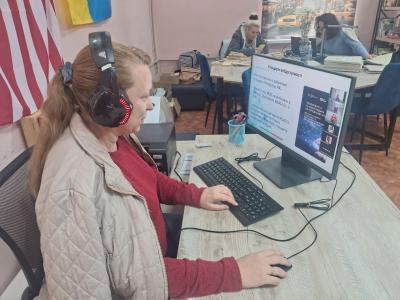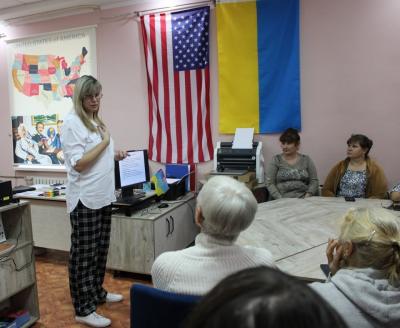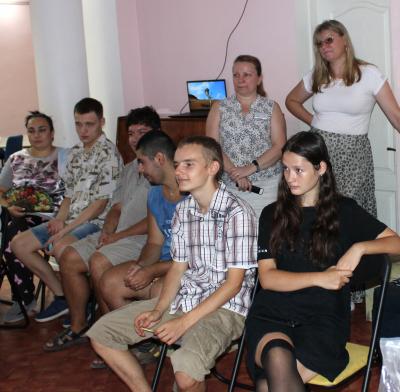Elise Strang L'Esperance
Elise Strang L'Esperance
Founder of cancer prevention clinics
(1878?-1959)
The Pap smear is one of the most common and successful early- detection tests for cancer. It has saved the lives of countless women who otherwise would have died of cervical cancer. The famous Pap smear was developed at a cancer clinic established by Dr. Elise L'Esperance. Dr. L'Esperance believed in the importance of early cancer detection, and she established the first clinics designed specifi¬cally for that purpose. Her clinics served as models for the establishment of other cancer clinics throughout the United States.
Elise Strang was born in Yorktown, New York, probably in 1878, but the exact date of her birth has never been verified. She was the sec¬ond of three daughters born to Albert and Kate Depew Strang. When Elise Strang decided to study medicine, she was accepted at the Women's Medical College of the New York Infirmary for Women and Children in New York City. The hospital and the school for treating and training women had been established by Dr. Elizabeth Blackwell, the first woman to receive a medical degree in the United States. While a student, Elise Strang married a lawyer, David A. L'Esperance Jr. Although the marriage did not last very long, she kept his name.
Elise Strang L'Esperance earned her M.D. degree in 1900. She was in the last class to graduate from the Women's Medical College before it merged with Cornell University's medical school.
After serving a one-year internship at New York Babies Hospital, she went into private practice as a pediatrician, first in Detroit, then in New York City. Dr. L'Esperance became frustrated by the limited ability of medicine to cure disease in the early 1900s; she saw many sick babies that she could not help. But great findings were coming out of medical research laboratories, and she turned her energies in that direction.
In 1908, Dr. L'Esperance was appointed to the New York Tuberculosis Research Commission. Tuberculosis was a major killer at that time. Although German physician Robert Koch had proved in 1882 that bacterium causes tuberculosis, antibiotics, which kill bacteria, had not yet been discovered. However, carefully controlled experimen¬tal techniques that would lead to such advances were being developed in medical research laboratories. One of the specialties practiced in these laboratories was pathology, the study of changes caused by disease in the cells, tissues, and organs of the body. Dr. L'Esperance became so fascinated with pathology that she took a lowly job as an assistant to a renowned pathologist, Dr. James Ewing, at Cornell University Medical College. It was only a technician's job," she told a New York newspaper reporter, but I knew I could pick up a tremendous amount of infor¬mation from one of the greatest pathologists in the world." His special¬ty was cancer.
Dr. L'Esperance had found her life's work. In 1912, she became an instructor in pathology at Cornell, and in 1920, she was appointed assis¬tant professor. Her research focused on the pathology of malignant tumors and the search for effective treatments. At the same time, she also served as a clinical pathologist at several leading New York hospi¬tals, including the New York Infirmary, where she was director of labo¬ratories.
In addition to her pathology work, Dr. L'Esperance became noted for her hats, unusual concoctions of fur and feathers. This tall, slim, and fast-moving doctor often was seen wearing her hat while working in the laboratory. "There was never any place to hang the thing," she said. "So I kept it on. Got in the habit. Now I'd feel headless without it.
Two deaths in her family changed the course of Dr. L'Esperance s work in the 1930s. One was the death of her uncle, Chauncey M. Depew, a wealthy railroad executive and U.S. senator. He left Dr. L'Esperance a sizable inheritance. The other death was that of her mother — from cancer. By then, Dr. L'Esperance had become convinced that cancer could be treated effectively if it was diagnosed early enough. She and her sister used their inheritance to found, in their mother's honor, the Kate Depew Strang Tumor Clinic at the New York Infirmary. They thought that setting up cancer clinics in their mother's name ' made more sense than a stained-glass window."
The first clinic for diagnosing and treating cancer in women opened in 1933 under the direction of Dr. L'Esperance. In 1937, she opened the Kate Depew Strang Cancer Prevention Clinic, devoted to the early detection of cancer in women. This clinic was staffed entirely by women physicians. Another Strang Cancer Prevention Clinic was opened at Memorial Hospital for Cancer and Allied Diseases and expanded its focus from women to include men and children. The founders of other cancer prevention clinics around the country looked to the Strang Clinics as their model.
Research also was conducted at the Strang clinics. Researchers there discovered that proctoscopic exams revealed cancers of the colon and rectum before there were any symptoms. But perhaps the most famous discovery was the test for cervical cancer developed by Strang researcher George Papanicolaou. The Pap smear is now performed on millions of women every year.
In 1942, Dr. L'Esperance returned to Cornell's medical school as assistant professor of preventive medicine. In 1950, she became a full professor, the first woman to hold that academic rank at Cornell, and retired that same year.
Even in her retirement, Dr. L'Esperance remained active. She was a member of several medical societies and hospital boards, and served as a consultant to the New York Infirmary until 195S. She always had been active in women's medical associations. She was president of the Women's Medical Society of New York State from 1935 to 1936, and of the American Medical Women's Association from 1948 to 1949. In addi¬tion, she was the editor of two women's medical journals.
Dr. L'Esperance died at the home she shared with her sister in Pelham Manor, New York, where she loved to raise horses, on January 21, 1959.
More detailed information can be found in the "Extraordinary Women of Medicine" Darlene R.Stille, and issued by The Children's Press in the USA.
Information should be used just for educational purposes.











Comments